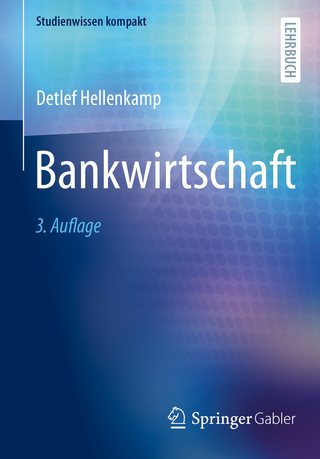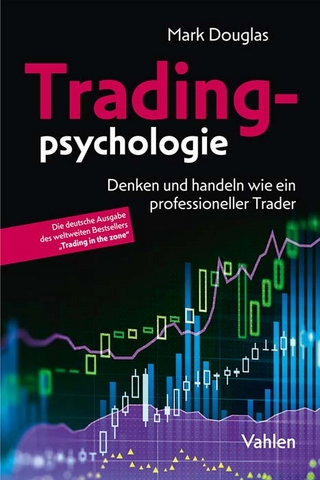
The Oxford Handbook of Banking
Oxford University Press (Verlag)
978-0-19-285950-1 (ISBN)
The Oxford Handbook of Banking, Third Edition provides an overview and analysis of developments and research in this rapidly evolving field. Aimed at graduate students of economics, banking, and finance; academics; practitioners; regulators; and policy makers, it strikes a balance between abstract theory, empirical analysis, and practitioner and policy-related material.
Split into five distinct parts The Oxford Handbook of Banking is a one-stop source of relevant research in banking. It examines the theory of banking, bank operations and performance, regulatory and policy perspectives, macroeconomic perspectives in banking, and international differences in banking structures and environments. Taking a global perspective it examines banking systems in the United States, China, Japan, Australia and New Zealand, Africa, the European Union, transition countries of Europe, and Latin America. Thematic issues covered include financial innovation and technological change; consumer and mortgage lending; Islamic banking; and how banks influence real economic activity.
Fully revised and now including brand new chapters on a range of geographical regions, bank bailouts and bail-ins, and behavioral economics amongst many other topics, this third edition of The Oxford Handbook of Banking provides readers with insights to seminal and contemporary research in banking and an opportunity to learn about the diversity of financial systems around the world.
Allen N. Berger is the H. Montague Osteen, Jr. Professor in Banking and Finance and Ph.D. coordinator of the Finance Department, Darla Moore School of Business; Carolina Distinguished Professor, University of South Carolina; Senior Fellow, Wharton Financial Institutions Center; and Fellow, European Banking Center. He also currently serves on the editorial boards of seven professional finance and economics journals. He is co-author of Bank Liquidity Creation and Financial Crises (Elsevier, 2016) and TARP and other Bank Bailouts and Bail-Ins around the World: Connecting Wall Street, Main Street, and the Financial System (Elsevier, 2019). He has published well over a hundred professional articles, including papers in top finance and economics journals. Philip Molyneux is Dean of the College of Business Administration at the University of Sharjah (in the UAE). His main area of research is on the structure and efficiency of banking markets and he has published widely in this area. Recent publications appear in the Journal of Money, Credit and Banking, Journal of Financial Intermediation, Journal of Banking & Finance and the Review of Finance. He has co-written or edited over thirty five books and is also the series editor of Studies in Banking and Financial Institutions (Palgrave Macmillan). In the past, Philip has acted as a consultant to the New York Federal Reserve Bank, the World Bank, the European Commission, the UK Treasury, Citibank Private Bank, Barclays Wealth, McKinsey, Credit Suisse, and various other international banks and consulting firms. John O.S. Wilson is Professor of Banking & Finance and Director of the Centre for Responsible Banking and Finance based at the University of St Andrews. He was the Founding Chair of the British Accounting and Finance Association Financial Markets and Institutions Special Interest Group and has guest edited special issues for the Journal of Corporate Finance, Journal of Banking & Finance, Journal of Economic Behaviour & Organization, European Journal of Finance, Public Money & Management, and the British Accounting Review. In 2018, John delivered evidence on the impact of Brexit on UK small and medium-sized enterprises to the House of Lords EU Internal Markets Committee. He is the author of Banking: A Very Short Introduction (OUP, 2016).
1: Allen N. Berger, Philip Molyneux, and John O.S. Wilson: Banking: A Decade On From The Global Financial Crisis
Part I: The Theory of Banking
2: Franklin Allen, Elena Carletti, and Xian Gu: The Roles of Banks in Financial Systems
3: Arnoud Boot and Anjan Thakor: Commercial Banking and Shadow Banking: The Accelerating Integration of Banks and Markets and its Implications for Regulation
4: Jacopo Carmassi and Richard Herring: Corporate Complexity and Systematic Risk: A Progress Report
5: Jens Hagendorff: Corporate Governance and Culture in Banking
6: Linda Allen and Anthony Saunders: Private Information and Risk Management in Banking
7: Christa Bouwman: Creation and Regulation of Bank Liquidity
Part II: Activities and Performance
8: Joe Hughes and Loretta Mester: The performance of Financial Institutions; Modeling, Evidence, and some Policy Implications
9: Scott Frame, Larry Wall, and Lawrence J. White: Technological Change and Financial Innovation in Banking: Some Implications for FinTech
10: David Humphrey: Payments
11: Dasol Kim and Donal McKillop: Community Banking Institutions: Commercial Banks, Savings Banks, Cooperative Banks, and Credit Unions
12: Narjess Boubakri, Ruiyuan (Ryan) Chen, Omrane Guedhami, and Xinming Li: Islamic Banking: A Review of the Empirical Literature and Future Research Directions
13: Robert Lensink and Erwin Bulte: Can We Improve the Impact of Microfinance? A Survey of the Recent Literature and Potential Avenues for Success
14: Allen N. Berger and Lamont Black: Small Business Lending: The Roles of Technology and Regulation from Pre-Crisis to Crisis to Recovery
15: Andreas Lehnert and Alex Martin: Residential Mortgages
16: Barbara Casu and Anna Sarkisyan: Securitization
17: Tobias Adrian, Adam Ashcraft, Peter Breuer and Nicola Cetorelli: Shadow Banking
Part III: Regulatory and Policy Perspectives
18: Frederic Mishkin: Modern Central Banking
19: Xavier Freixas and Bruno Parigi: Lender of Last Resort: A New Role for the Old Instrument
20: Raluca Roman: Bank Bailouts and Bail-Ins
21: Deniz Anginer and Asli Demirguc-Kunt: Bank Runs and Moral Hazard: A Review of Deposit Insurance
22: Mark Van Der Weide and Jeffery Zhang: Bank Capital Requirements after The Financial Crisis
23: Mark Flannery and Rob Bliss: Market Discipline in Regulation: Pre and Post Crisis
24: Hans Degryse, Paola Morales-Acevedo and Steven Ongena: Competition in The Banking Sector
25: Gregory Elliehausen: Behavioral Economics, Financial Literacy and Consumers' Financial Decisions
Part IV: Macroeconomic Perspectives
26: Olivier de Bandt and Philipp Hartmann: Systematic Risk in Banking after The Great Financial Crisis
27: Gerry Caprio Jr and Patrick Honohan: Hardy Perennials: Banking Crises Around the World
28: Charles Calomiris: Bank Failures, The Great Depression and Other 'Contagious' Events
29: Claudia Buch and Gayle L. DeLong: Banking Globilization: Cross-Border Entry, Complexity, and Systematic Risk
30: Nicola Cetorelli and Michael Blank: Banking and Real Economic Activity: Foregone Conclusions and Open Challenges
Part V: Banking Systems Around the World
31: Robert DeYoung: Banking in the United States
32: John Goddard, Philip Molyneux, and John O.S. Wilson: Banking in Europe: Integration, Reform, and the Road to a Banking Union
33: Hirofumi Uchida and Gregory Udell: Banking in Japan: A Post-global Financial Crisis Perspective
34: Thorsten Beck, Robert Cull and Patricio Valenzuela: Banking in Africa
35: Leora Klapper, Maria Soledad Martinez Peria, and Bilal Zia: Banking in China
36: Zuzana Fungá?ová, Iftekhar Hasan, Laura Solanko, Paul Wachtel: Banking in the Transition Countries of Central, Southern and Eastern Europe and the Former Soviet Union
37: Fernando J. Cardim de Carvalho, Luiz Fernando de Paula, and Jonathan Williams: Banking in Latin America: Developments and Prospects
38: Fariborz Moshirian and Eliza Wu: Banking in Australia and New Zealand - Geographic Proximity, Market Concentration, and Banking Integration
Index
| Erscheinungsdatum | 06.01.2022 |
|---|---|
| Reihe/Serie | Oxford Handbooks |
| Verlagsort | Oxford |
| Sprache | englisch |
| Maße | 171 x 245 mm |
| Gewicht | 1672 g |
| Themenwelt | Recht / Steuern ► EU / Internationales Recht |
| Recht / Steuern ► Wirtschaftsrecht ► Bank- und Kapitalmarktrecht | |
| Wirtschaft ► Betriebswirtschaft / Management ► Finanzierung | |
| Betriebswirtschaft / Management ► Spezielle Betriebswirtschaftslehre ► Bankbetriebslehre | |
| Wirtschaft ► Volkswirtschaftslehre | |
| ISBN-10 | 0-19-285950-1 / 0192859501 |
| ISBN-13 | 978-0-19-285950-1 / 9780192859501 |
| Zustand | Neuware |
| Haben Sie eine Frage zum Produkt? |
aus dem Bereich


